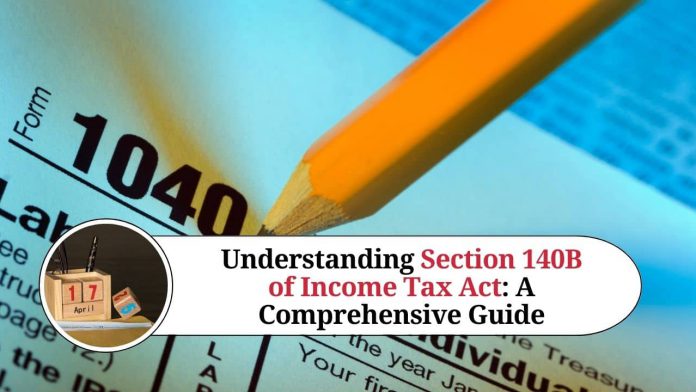Section 140B of the Income Tax Act, 1961 was introduced in the year 2017 as part of the Finance Act. This section aims to simplify the process of income tax returns (ITR) by providing relief to taxpayers who may have missed the deadline for filing their returns. In this article, we will delve deeper into the provisions of Section 140B and understand how it works.
What is Section 140B of Income Tax Act?
Section 140B of the Income Tax Act, 1961 is a provision that allows taxpayers to file their income tax returns after the due date has passed. However, this relief is only available to taxpayers who have no tax liability or have paid all their taxes due until the due date for filing the return. In simpler terms, if you have any outstanding tax liability, you cannot avail the benefits of Section 140B.
How does Section 140B work?
Let’s say you missed the due date for filing your income tax return, which is usually July 31st of the assessment year (AY). For instance, if you missed the due date for AY 2021-22, which is July 31, 2021, you can still file your return under Section 140B until December 31, 2022. However, you will have to pay a late filing fee of up to Rs. 10,000, depending on the delay.
In case you file your return after the due date but before December 31, 2022, you will have to pay a late filing fee of Rs. 5,000 if you file the return by December 31, 2021, or Rs. 10,000 if you file the return between January 1, 2022, and December 31, 2022. However, if your total income does not exceed Rs. 5 lakhs, the maximum penalty you will have to pay is Rs. 1,000.
Who can benefit from Section 140B?
Section 140B of the Income Tax Act can be beneficial for taxpayers who have missed the deadline for filing their income tax returns but have no tax liability or have paid all their taxes due until the due date. For instance, if you have already paid all your taxes through TDS (Tax Deducted at Source), you can file your return under Section 140B without incurring any penalty.
However, if you have any outstanding tax liability, you cannot take advantage of Section 140B. In such cases, it is advisable to file your return as soon as possible to avoid further penalties and interest.
Conclusion
Section 140B of the Income Tax Act, 1961 is a beneficial provision for taxpayers who have missed the deadline for filing their income tax returns. However, it is important to note that this provision is only applicable if you have no tax liability or have paid all your taxes due until the due date. Therefore, it is always advisable to file your income tax returns on time and avoid any late filing penalties. If you have any doubts or questions regarding Section 140B, it is advisable to consult a tax expert.
Other Related Blogs: Section 144B Income Tax Act
Frequently Asked Questions (FAQs)
Q.1 What is Section 140B of the Income Tax Act?
Answer: Section 140B of the Income Tax Act, 1961 is a provision that allows taxpayers to file their income tax returns after the due date has passed if they have no tax liability or have paid all their taxes due until the due date.
Q.2 What is the deadline for filing the income tax return under Section 140B?
Answer: Taxpayers can file their income tax returns under Section 140B until December 31 of the relevant assessment year.
Q.3 Is there any penalty for filing the income tax return under Section 140B?
Answer: Yes, taxpayers will have to pay a late filing fee of up to Rs. 10,000, depending on the delay.
Q.4 Who can benefit from Section 140B?
Answer: Taxpayers who have missed the deadline for filing their income tax returns but have no tax liability or have paid all their taxes due until the due date can benefit from Section 140B.
Q.5 Can taxpayers file their income tax returns under Section 140B if they have any outstanding tax liability?
Answer: No, taxpayers cannot file their income tax returns under Section 140B if they have any outstanding tax liability.
Q.6 Is there any relief for taxpayers with income less than Rs. 5 lakhs?
Answer: Yes, if the taxpayer’s total income does not exceed Rs. 5 lakhs, the maximum penalty they will have to pay is Rs. 1,000.
Q.7 What is the due date for filing income tax returns for individuals?
Answer: The due date for filing income tax returns for individuals is usually July 31st of the relevant assessment year.
Q.8 What should taxpayers do if they have missed the due date for filing their income tax returns?
Answer: Taxpayers should file their income tax returns as soon as possible to avoid further penalties and interest.
Q.9 Can taxpayers avail of the benefits of Section 140B if they have filed their income tax returns but have not paid the taxes due?
Answer: No, taxpayers cannot avail of the benefits of Section 140B if they have not paid the taxes due until the due date.
Q.10 Is it advisable to consult a tax expert if taxpayers have any doubts or questions regarding Section 140B?
Answer: Yes, it is always advisable to consult a tax expert if taxpayers have any doubts or questions regarding Section 140B.




















